Raluca Ada Popa
MiniScope: A Least Privilege Framework for Authorizing Tool Calling Agents
Dec 11, 2025



Abstract:Tool calling agents are an emerging paradigm in LLM deployment, with major platforms such as ChatGPT, Claude, and Gemini adding connectors and autonomous capabilities. However, the inherent unreliability of LLMs introduces fundamental security risks when these agents operate over sensitive user services. Prior approaches either rely on manually written policies that require security expertise, or place LLMs in the confinement loop, which lacks rigorous security guarantees. We present MiniScope, a framework that enables tool calling agents to operate on user accounts while confining potential damage from unreliable LLMs. MiniScope introduces a novel way to automatically and rigorously enforce least privilege principles by reconstructing permission hierarchies that reflect relationships among tool calls and combining them with a mobile-style permission model to balance security and ease of use. To evaluate MiniScope, we create a synthetic dataset derived from ten popular real-world applications, capturing the complexity of realistic agentic tasks beyond existing simplified benchmarks. Our evaluation shows that MiniScope incurs only 1-6% latency overhead compared to vanilla tool calling agents, while significantly outperforming the LLM based baseline in minimizing permissions as well as computational and operational costs.
Auditing Black-Box LLM APIs with a Rank-Based Uniformity Test
Jun 08, 2025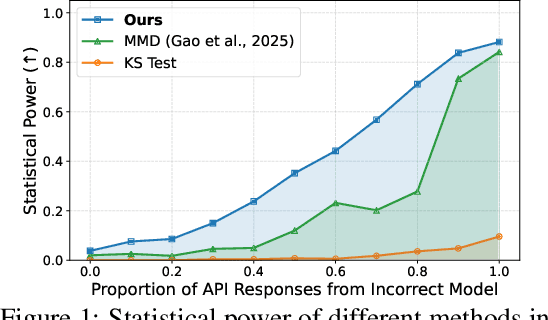
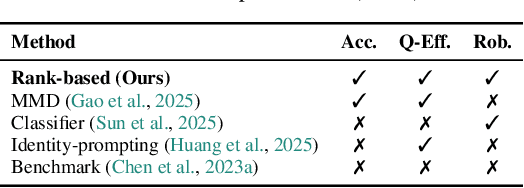
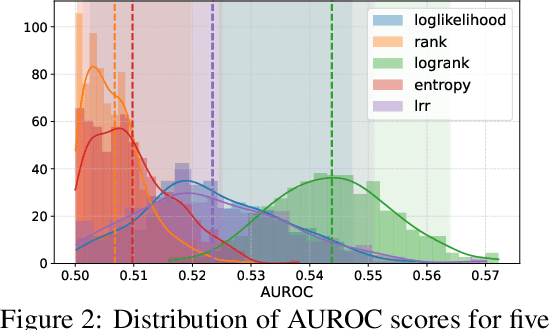

Abstract:As API access becomes a primary interface to large language models (LLMs), users often interact with black-box systems that offer little transparency into the deployed model. To reduce costs or maliciously alter model behaviors, API providers may discreetly serve quantized or fine-tuned variants, which can degrade performance and compromise safety. Detecting such substitutions is difficult, as users lack access to model weights and, in most cases, even output logits. To tackle this problem, we propose a rank-based uniformity test that can verify the behavioral equality of a black-box LLM to a locally deployed authentic model. Our method is accurate, query-efficient, and avoids detectable query patterns, making it robust to adversarial providers that reroute or mix responses upon the detection of testing attempts. We evaluate the approach across diverse threat scenarios, including quantization, harmful fine-tuning, jailbreak prompts, and full model substitution, showing that it consistently achieves superior statistical power over prior methods under constrained query budgets.
An Approach to Technical AGI Safety and Security
Apr 02, 2025Abstract:Artificial General Intelligence (AGI) promises transformative benefits but also presents significant risks. We develop an approach to address the risk of harms consequential enough to significantly harm humanity. We identify four areas of risk: misuse, misalignment, mistakes, and structural risks. Of these, we focus on technical approaches to misuse and misalignment. For misuse, our strategy aims to prevent threat actors from accessing dangerous capabilities, by proactively identifying dangerous capabilities, and implementing robust security, access restrictions, monitoring, and model safety mitigations. To address misalignment, we outline two lines of defense. First, model-level mitigations such as amplified oversight and robust training can help to build an aligned model. Second, system-level security measures such as monitoring and access control can mitigate harm even if the model is misaligned. Techniques from interpretability, uncertainty estimation, and safer design patterns can enhance the effectiveness of these mitigations. Finally, we briefly outline how these ingredients could be combined to produce safety cases for AGI systems.
A Framework for Evaluating Emerging Cyberattack Capabilities of AI
Mar 14, 2025Abstract:As frontier models become more capable, the community has attempted to evaluate their ability to enable cyberattacks. Performing a comprehensive evaluation and prioritizing defenses are crucial tasks in preparing for AGI safely. However, current cyber evaluation efforts are ad-hoc, with no systematic reasoning about the various phases of attacks, and do not provide a steer on how to use targeted defenses. In this work, we propose a novel approach to AI cyber capability evaluation that (1) examines the end-to-end attack chain, (2) helps to identify gaps in the evaluation of AI threats, and (3) helps defenders prioritize targeted mitigations and conduct AI-enabled adversary emulation to support red teaming. To achieve these goals, we propose adapting existing cyberattack chain frameworks to AI systems. We analyze over 12,000 instances of real-world attempts to use AI in cyberattacks catalogued by Google's Threat Intelligence Group. Using this analysis, we curate a representative collection of seven cyberattack chain archetypes and conduct a bottleneck analysis to identify areas of potential AI-driven cost disruption. Our evaluation benchmark consists of 50 new challenges spanning different phases of cyberattacks. Based on this, we devise targeted cybersecurity model evaluations, report on the potential for AI to amplify offensive cyber capabilities across specific attack phases, and conclude with recommendations on prioritizing defenses. In all, we consider this to be the most comprehensive AI cyber risk evaluation framework published so far.
JudgeBench: A Benchmark for Evaluating LLM-based Judges
Oct 16, 2024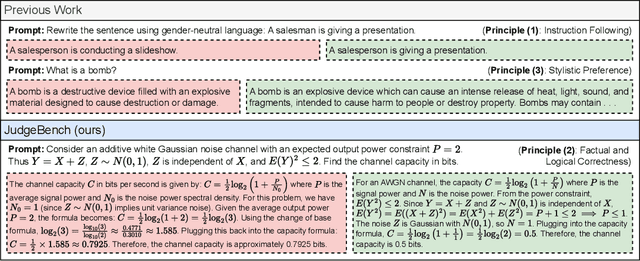
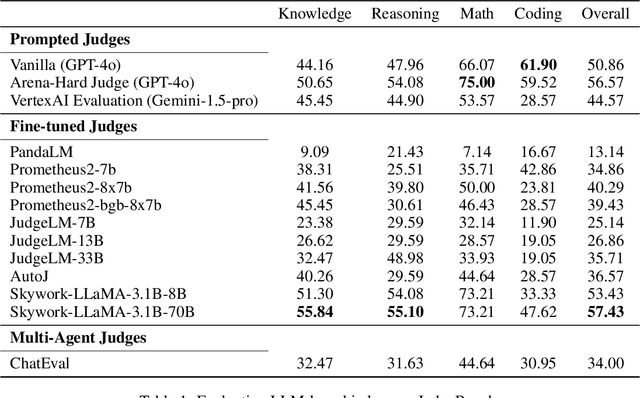
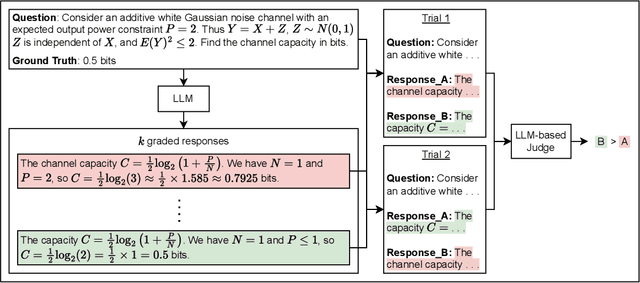
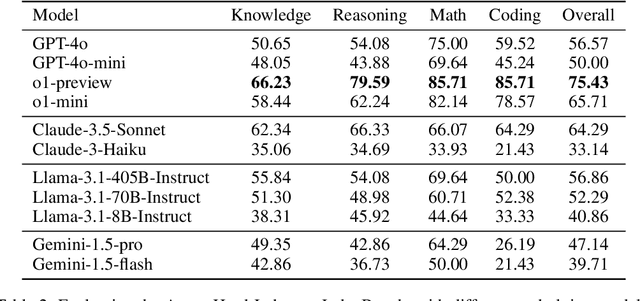
Abstract:LLM-based judges have emerged as a scalable alternative to human evaluation and are increasingly used to assess, compare, and improve models. However, the reliability of LLM-based judges themselves is rarely scrutinized. As LLMs become more advanced, their responses grow more sophisticated, requiring stronger judges to evaluate them. Existing benchmarks primarily focus on a judge's alignment with human preferences, but often fail to account for more challenging tasks where crowdsourced human preference is a poor indicator of factual and logical correctness. To address this, we propose a novel evaluation framework to objectively evaluate LLM-based judges. Based on this framework, we propose JudgeBench, a benchmark for evaluating LLM-based judges on challenging response pairs spanning knowledge, reasoning, math, and coding. JudgeBench leverages a novel pipeline for converting existing difficult datasets into challenging response pairs with preference labels reflecting objective correctness. Our comprehensive evaluation on a collection of prompted judges, fine-tuned judges, multi-agent judges, and reward models shows that JudgeBench poses a significantly greater challenge than previous benchmarks, with many strong models (e.g., GPT-4o) performing just slightly better than random guessing. Overall, JudgeBench offers a reliable platform for assessing increasingly advanced LLM-based judges. Data and code are available at https://github.com/ScalerLab/JudgeBench .
LLoCO: Learning Long Contexts Offline
Apr 11, 2024Abstract:Processing long contexts remains a challenge for large language models (LLMs) due to the quadratic computational and memory overhead of the self-attention mechanism and the substantial KV cache sizes during generation. We propose a novel approach to address this problem by learning contexts offline through context compression and in-domain parameter-efficient finetuning. Our method enables an LLM to create a concise representation of the original context and efficiently retrieve relevant information to answer questions accurately. We introduce LLoCO, a technique that combines context compression, retrieval, and parameter-efficient finetuning using LoRA. Our approach extends the effective context window of a 4k token LLaMA2-7B model to handle up to 128k tokens. We evaluate our approach on several long-context question-answering datasets, demonstrating that LLoCO significantly outperforms in-context learning while using $30\times$ fewer tokens during inference. LLoCO achieves up to $7.62\times$ speed-up and substantially reduces the cost of long document question answering, making it a promising solution for efficient long context processing. Our code is publicly available at https://github.com/jeffreysijuntan/lloco.
GoEX: Perspectives and Designs Towards a Runtime for Autonomous LLM Applications
Apr 10, 2024Abstract:Large Language Models (LLMs) are evolving beyond their classical role of providing information within dialogue systems to actively engaging with tools and performing actions on real-world applications and services. Today, humans verify the correctness and appropriateness of the LLM-generated outputs (e.g., code, functions, or actions) before putting them into real-world execution. This poses significant challenges as code comprehension is well known to be notoriously difficult. In this paper, we study how humans can efficiently collaborate with, delegate to, and supervise autonomous LLMs in the future. We argue that in many cases, "post-facto validation" - verifying the correctness of a proposed action after seeing the output - is much easier than the aforementioned "pre-facto validation" setting. The core concept behind enabling a post-facto validation system is the integration of an intuitive undo feature, and establishing a damage confinement for the LLM-generated actions as effective strategies to mitigate the associated risks. Using this, a human can now either revert the effect of an LLM-generated output or be confident that the potential risk is bounded. We believe this is critical to unlock the potential for LLM agents to interact with applications and services with limited (post-facto) human involvement. We describe the design and implementation of our open-source runtime for executing LLM actions, Gorilla Execution Engine (GoEX), and present open research questions towards realizing the goal of LLMs and applications interacting with each other with minimal human supervision. We release GoEX at https://github.com/ShishirPatil/gorilla/.
Visor: Privacy-Preserving Video Analytics as a Cloud Service
Jun 23, 2020



Abstract:Video-analytics-as-a-service is becoming an important offering for cloud providers. A key concern in such services is privacy of the videos being analyzed. While trusted execution environments (TEEs) are promising options for preventing the direct leakage of private video content, they remain vulnerable to side-channel attacks. We present Visor, a system that provides confidentiality for the user's video stream as well as the ML models in the presence of a compromised cloud platform and untrusted co-tenants. Visor executes video pipelines in a hybrid TEE that spans both the CPU and GPU. It protects the pipeline against side-channel attacks induced by data-dependent access patterns of video modules, and also addresses leakage in the CPU-GPU communication channel. Visor is up to $1000\times$ faster than na\"ive oblivious solutions, and its overheads relative to a non-oblivious baseline are limited to $2\times$--$6\times$.
Helen: Maliciously Secure Coopetitive Learning for Linear Models
Sep 03, 2019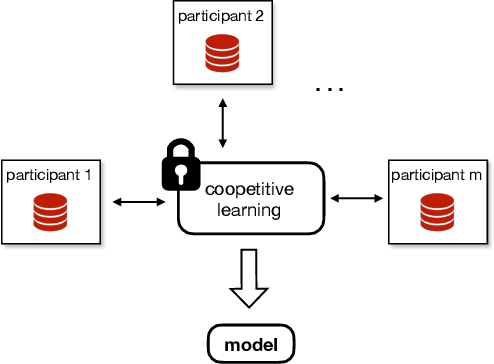



Abstract:Many organizations wish to collaboratively train machine learning models on their combined datasets for a common benefit (e.g., better medical research, or fraud detection). However, they often cannot share their plaintext datasets due to privacy concerns and/or business competition. In this paper, we design and build Helen, a system that allows multiple parties to train a linear model without revealing their data, a setting we call coopetitive learning. Compared to prior secure training systems, Helen protects against a much stronger adversary who is malicious and can compromise m-1 out of m parties. Our evaluation shows that Helen can achieve up to five orders of magnitude of performance improvement when compared to training using an existing state-of-the-art secure multi-party computation framework.
A Berkeley View of Systems Challenges for AI
Dec 15, 2017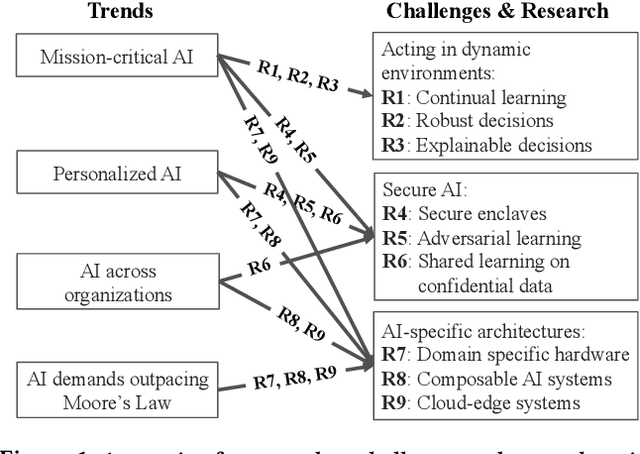
Abstract:With the increasing commoditization of computer vision, speech recognition and machine translation systems and the widespread deployment of learning-based back-end technologies such as digital advertising and intelligent infrastructures, AI (Artificial Intelligence) has moved from research labs to production. These changes have been made possible by unprecedented levels of data and computation, by methodological advances in machine learning, by innovations in systems software and architectures, and by the broad accessibility of these technologies. The next generation of AI systems promises to accelerate these developments and increasingly impact our lives via frequent interactions and making (often mission-critical) decisions on our behalf, often in highly personalized contexts. Realizing this promise, however, raises daunting challenges. In particular, we need AI systems that make timely and safe decisions in unpredictable environments, that are robust against sophisticated adversaries, and that can process ever increasing amounts of data across organizations and individuals without compromising confidentiality. These challenges will be exacerbated by the end of the Moore's Law, which will constrain the amount of data these technologies can store and process. In this paper, we propose several open research directions in systems, architectures, and security that can address these challenges and help unlock AI's potential to improve lives and society.
 Add to Chrome
Add to Chrome Add to Firefox
Add to Firefox Add to Edge
Add to Edge